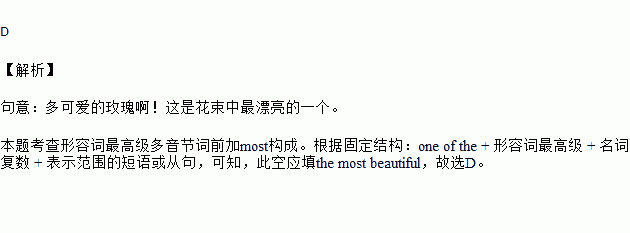题目内容
What a lovely rose! It's one of __________ in the bouquet (花束).
A.beautiful B.more beautiful C.most beautiful D.the most beautiful
 每日10分钟口算心算速算天天练系列答案
每日10分钟口算心算速算天天练系列答案What problems do the teenagers probably have?Here is a survey showing their main problems.
Problems | Causes | Advice |
Feeling stressed | Too much homework. Don't have enough time for their hobbies. | Make a plan for study and hobbies.Find time to relax as often as possible. |
Getting short?sighted | Too much homework. Bad reading and writing habits. | Do homework or read in a correct way. |
Fights | Don't know how to get on well with classmates. | Make more friends and understand each other.Share your problems with them. |
Feeling tired of study | Computer games' bad influence. | Don't be crazy about computer games.Play them just for a short time when you are tired. |
Getting fat | Having more pocket money to buy snacks. Dislike doing exercise. | Use your pocket money to do something meaningful.Spend some time doing exercise every day. |
1.If Simon is feeling stressed,he should ________.
A.do much more homework B.make a plan to spend time on study and hobbies
C.donate his pocket money to Project Hope D.buy some snacks
2.Peter is tired of study,maybe because he ________.
A.has no close friends B.has no pocket money
C.plays too many computer games D.gets fatter and fatter
3.________ is a good way for the teenagers to stop fights.
A.Doing less homework B.Playing computer games
C.Learning how to make friends D.Paying no attention to each other

